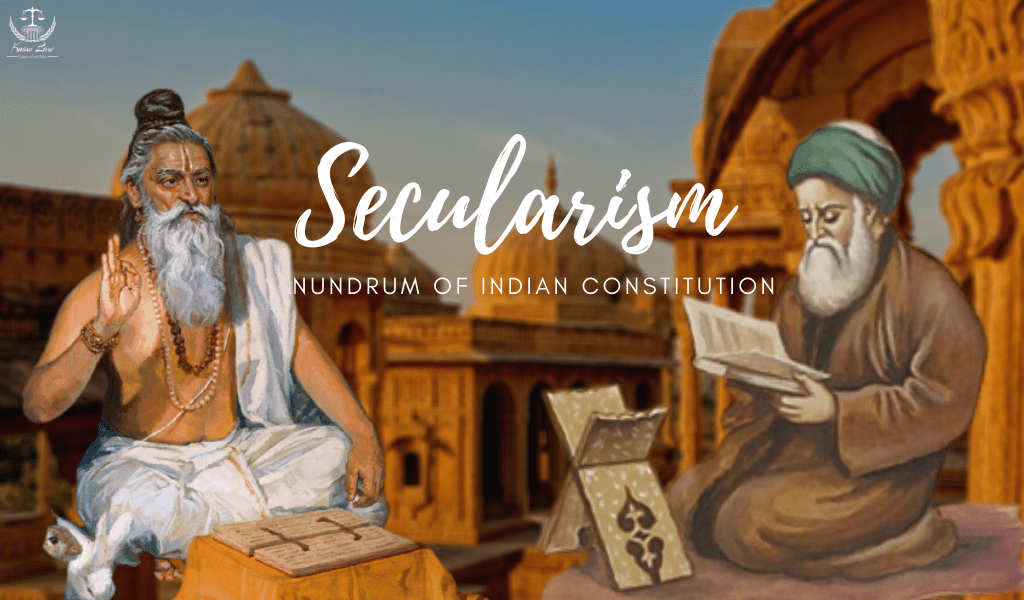
India is a unique State, promoting secularism and preserving spirituality through constitutional provisions and judicial pronouncements. In simple terms, secularism can be defined as the ‘principle of separation of state from the religious institution‘. In the concept of secularism, the government must remain neutral in religious matters, leaving the religious choice to the liberty of the people.
There are many countries that promote a particular religion as a religion of the State; however, in this context, the Constitution of India is unique. Under the 42nd Amendment Act 1976, the word ‘secular’ was added in the Preamble. As per the Preamble to the Constitution, India is a secular state. Secularism provides a multicultural, multi-lingual, and plural society. India plays a significant role in maintaining religious balance and reducing conflicts based on religion. However, secularism in India, it is also argued, leads to the intensification of communalism.
Secularism in the context of the Indian Constitution
As per the Indian Constitution, there is no state religion. It provides freedom of religion, forbids the state to promote any religion, and provides a variety of secular provisions. The state does not have its own religion; however, it is not completely neutral in the matter of religion in order to promote modernity. Law being a prominent form of social control plays an important role in maintaining secularism. As per the concept of secularism in India, religion and state are two different matters and they should not be mixed for peaceful coordination.
The Preamble of the Constitution of India proclaims secularism as a basic feature of the Indian Constitution. Part III of the Constitution plays a major role in implementing this. The Right to Equality is a fundamental right; any discrimination by the state on the basis of religion (and other factors) is prohibited. Apart from this, Articles 25 to 28 deal with the ‘Right to Freedom of Religion’. It gives freedom to individuals to practice and profess any religion of their choice.

In this context, Article 25 of the Indian Constitution enumerates the fundamental right of every person to freedom of conscience and the right to freely profess, practice, and propagate religion. But equally importantly, it provides that the state may regulate any economic, financial, political, or other secular activity associated with religious practice. Article 26 grants the freedom to manage affairs to every religious denomination. Article 27 prohibits any taxation on the basis of religion and Article 28 provides for freedom as to attendance at religious instruction in certain educational institutions. The rights of minorities are protected under Articles 29 and 30 which provide for the conservation of any distinct language, script, or culture, and also the right of minorities to establish and administer educational institutions of their choice.
The above-mentioned Articles, combined with Articles 15 and 16 which prohibit discrimination on religious grounds (among other grounds), and also Article 14 (right to equality) form the bedrock of the Indian secular mandate. These protections give a truly secular image of the Indian Constitution. However, the concept of secularism is not defined in the Indian Constitution. But it is protected by Fundamental Rights and Directive Principles of State Policy.
Role of Judiciary
The concept of secularism for the first time was explained in Saheb v. State of Bombay where Justice Ayyangar explained Articles 25 and 26 embody the principle of religious toleration that has been the characteristic feature of Indian civilization from the start of history; the instances and periods when this feature was absent being merely temporary aberrations. Besides, they serve to emphasize the secular nature of the Indian democracy which the founding fathers considered to be the very basis of the Constitution. Apart from this, the judiciary for the first time expressed its views on the secular nature of the Constitution in Sardar Syedna Taher Saheb v. State of Bombay.
In the landmark judgment of the Supreme Court of India in S.R. Bommai v. Union of India, it was held that Religious tolerance and equal treatment of all religious groups and protection of their life and property and the places of their worship are essential parts of secularism enshrined in our Constitution, while the citizen of this country is free to profess, practice such religion, faith or belief as they choose so for as the state is concerned i.e. from the point of view of the state, the religion, faith or belief of a person is immaterial to it, all are equal and all are entitled to be treated equally.
Supreme Court in SR Bommai v. Union of India (1994) discussed the protective concept of Indian secularism as an instrument of maintaining national unity and equality. So far legal decisions such as SR Bommai, etc. have played an important role in defining the parameters of secularism in the Indian Constitution.
Conundrum of the Indian Constitution
In August 2019, India celebrated the seventy-third anniversary of its independence from British rule. Almost seven decades with constitutional democracy. No doubt we are moving from religiosity to secular ways of life, but even after 73 years of independence, India is still struggling to convert the concept of secularism into reality. Trends of communalism and communal violence have been continuously increasing on a large scale. No doubt, secularism plays a key role in maintaining religious stability and upholding human rights but today the ideology and practice of secularism are being questioned by many. Many criticize secularism as a root cause of the crisis in India today. Madan mentioned the concept of secularism as an ‘inadequately defined attitude’.
Various political organizations that are actually communal forces are dominating in the name of religion. A communal political party has become one of the major threats to secularism. Another major threat to secularism is the mingling of politics and religion. Communalism is born out of secular issues and communal parties are led by, or communalism is promoted by secular leaders. Communalism is manifested through various religious mass movements which again have more to do with politics rather than religion.

During the ten years from 1954-1963, there was an average of 62 communal riots annually, and the number of these killed around 40 a year. The intensity of riots increased in the 1980s, major communal riots occurred in Moradabad in 1980, Biharsharif in 1981, Baroda and Meerut in 1982, Assam in 1983, Anti Sikh riots in Delhi, and other places in 1984. Apart from this, more than 2,000 people were killed in Gujarat communal riots (2002). However, there had been 779 communal incidents in the year 2005. As per the current status, at least 111 people were killed and 2,384 others injured in 822 communal incidents in the country in 2017.
State policies play an important role in the enhancement of secularism. The policy adopted by the state is mostly of dual nature. On one hand, lie the secular protestations to encounter communalism and on the other hand, is present a running threat of accommodations, compromising and legitimating of communal forces by the non-enactment of Uniform Civil Code to the enactment of Muslim Women (Protection of Rights on Divorce) Act. Such policies of the state mostly favor one community.
The growing fundamentalism is also making the situation worse. Fundamentalism between Hindu and Muslim is a serious threat to the concept of secularism. On the other hand, even political parties do not allow secularism to take precedence over their political interest. Various political parties in India have been seen to use religion and caste factors as a tool for the promotion of their political interest.
Conclusion
As under the concept of secularism, the state has no religion of its own, secular states do not interfere in religious matters. The most important object of secularism is to promote unity among the people of the nation. However, we cannot ignore the fact that Indian secularism is a mockery of many secular and democratic principles.
Presently, India is dealing with a variety of issues concerning secularism. The lack of the Uniform Civil Code, as well as rights granted on a basis of the caste-based social system, continues to heighten tensions in India. Existing personal and penal laws also create a divide. India can never play a role model for a secular society. In order to stabilize the situation, all secular laws in India must be enforced uniformly. Separate personal laws and caste-based reservations must be done away with.
Editor’s Note
It is a well-known fact that India is a secular nation; meaning thereby that there is no state religion and the Government remains neutral in religious matters. The Constitution of India also ensures religious freedom to each and every citizen of India. This article explains the concept of secularism as enshrined in the Preamble of the Indian Constitution and its various provisions as well as the role of the Indian judiciary in promoting secularism in the country.
The article also throws light upon certain challenges posed by the practice of secularism, particularly in the Indian context. The author has concluded by saying that all the secular laws in India must be implemented uniformly in order to promote unity among the people of the nation.
Submitted by Nikita Sharma and Riddhi Chaddha of Fairfield Institute of Management and Technology.